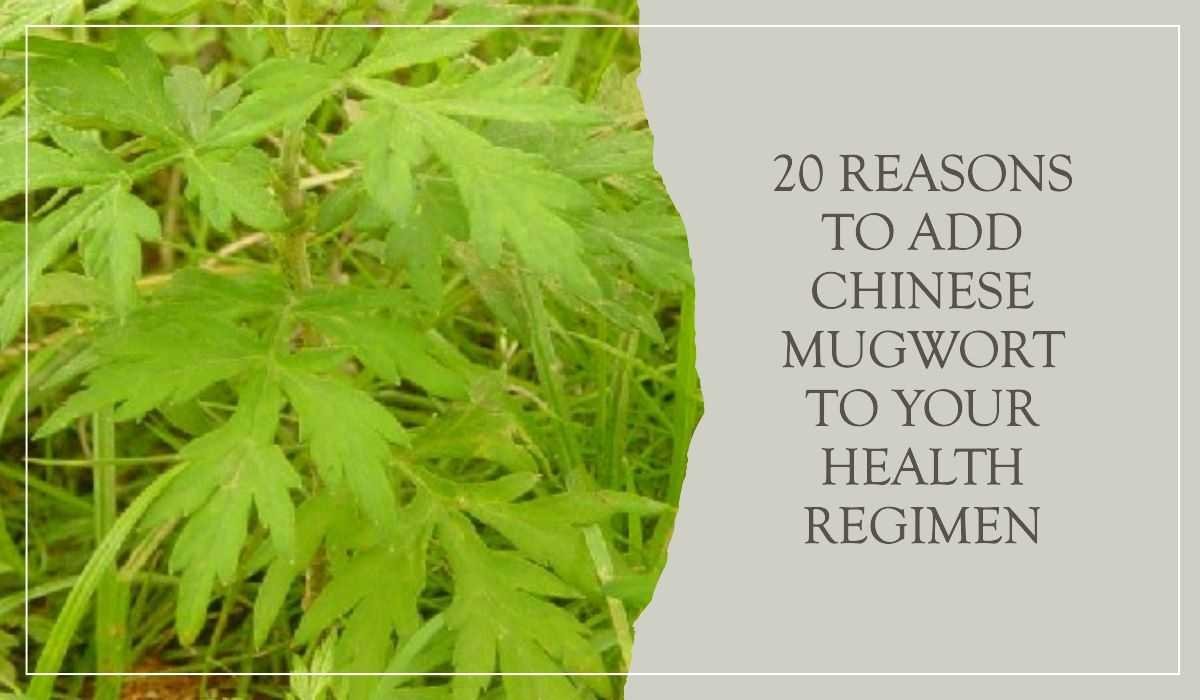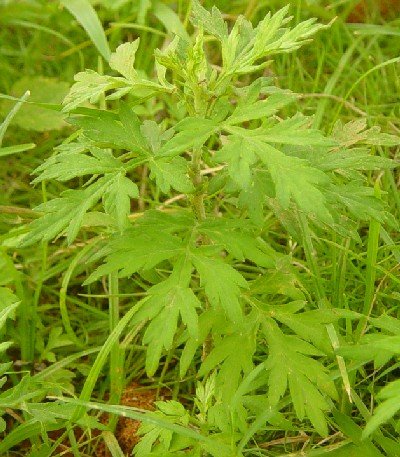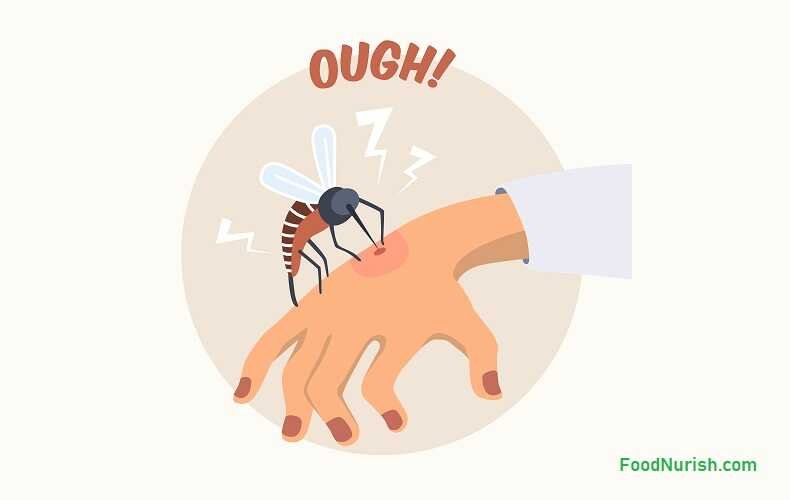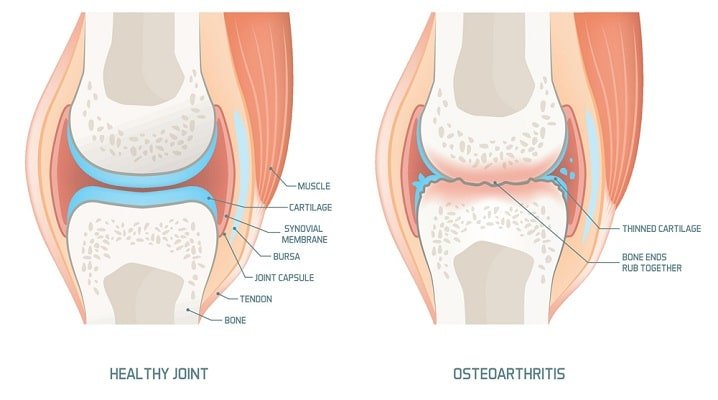20 Chinese Mugwort Benefits According To Science (Artemisia Argyi) (Ai Ye)

Are you curious about the potential benefits of Chinese Mugwort? Look no further! In this article, we will explore 20 evidence-based benefits of Artemisia Argyi (Ai Ye) according to science.
Chinese Mugwort has been traditionally used in Chinese medicine for various conditions, but does it really deliver on its promises? We’ll delve into its history, discuss its potential side effects, and provide insights on how to use it effectively.
Get ready to discover the power of Chinese Mugwort and make informed decisions about your health.
What is Artemisiae Argyi (Chinese Mugwort) (Ai Ye)?
Artemisia Argyi, commonly known as Chinese Mugwort (Ai Ye), is a plant deeply rooted in Chinese tradition and renowned for its diverse applications and potential health benefits. Originating from China, this herb flourishes in various environments such as hillsides, grassy areas, and forest edges.
Its appearance resembles a shrub, standing over three feet tall, adorned with small greenish-yellow flowers and grayish-green leaves. These leaves are meticulously gathered during the spring and summer, carefully dried in shaded sanctuaries, and subsequently employed for medicinal purposes.
In the Guangdong region, the tender young leaves of Argy Wormwood find their way onto winter and spring dining tables, cherished as a vegetable delicacy. Additionally, in South China, Ai Ye becomes an integral component of delectable glutinous rice cakes.
These cakes, crafted with a blend of glutinous rice flour and assorted fillings such as peanut, sesame, and white sugar, resonate with the community’s culinary traditions. An intriguing facet of this herb’s cultural significance emerges during the Dragon Boat Festival when Ai Ye adorns doorways, believed to thwart malevolent forces from entering homes, thereby safeguarding households throughout the year.

In the realm of Traditional Chinese Medicine (TCM), Chinese Mugwort occupies a distinct place within the category of ‘Herbs that invigorate the blood.’ Notably, this group of herbs is esteemed for their capacity to enhance blood circulation, particularly beneficial for individuals contending with cardiovascular issues, Blood Stagnation, or menstrual irregularities.
Noteworthy for its warm nature, Chinese Mugwort serves as a harmonizing force for individuals grappling with excess Cold within their bodies. This is particularly pertinent for those experiencing imbalances like Yin Excess or Yang Deficiency, fostering a restoration of the vital yin-yang equilibrium.
The herb’s taste profile, encompassing bitterness and pungency, contributes to its purifying prowess. It engages in Heat clearance, Dampness reduction, and stimulates the body’s eliminative functions through urination and bowel movements. Furthermore, Chinese Mugwort plays a role in catalyzing the flow of qi (vital energy) and body fluids.
Artemisiae Argyi, scientifically known as Ai Ye, is deeply rooted in Chinese heritage and offers both tradition and potential health benefits. Its use in traditional Chinese medicine for centuries has sparked studies into its properties, including antifatigue, antifungal, anti-inflammatory, antimicrobial, antioxidant, cardiovascular, antidiabetic, immune-boosting, and insect-repelling effects. However, the lack of comprehensive clinical trials calls for caution when considering specific uses.
In the commercial realm, Chinese Mugwort appears in various forms like powders and oils in the United States and Europe. Its applications often involve supporting heart health and easing issues like asthma or coughs.
What are Chinese Mugwort Benefits (or Artemisiae Argyi Benefits)?
Chinese Mugwort, also known as Artemisiae Argyi or Ai Ye, has been traditionally used for its various health benefits. This powerful herb has been shown to relieve stress, boost energy levels, improve sleep quality, alleviate itching sensations, and promote blood circulation.
Studies have supported these claims by demonstrating the herb’s potential antifungal, anti-inflammatory, antioxidant, and cardiovascular effects. Here are some of the most important Chinese mugwort benefits that are backed by scientific evidence.
1. Relieves stress

Mugwort can help alleviate stress and promote relaxation. Research suggests that mugwort contains compounds with antioxidant and anti-inflammatory effects, which may contribute to its calming properties. These compounds work by reducing the production of stress hormones and promoting the release of neurotransmitters that induce relaxation.
In a study with broiler chickens, researchers explored the effects of Artemisia argyi extract (AAE) on immune stress. Chickens were divided into groups with different diets and immune stress treatments.
AAE prevented growth reductions caused by stress and lowered stress hormone levels. Some immune factors improved, but AAE also affected certain immune markers. Overall, AAE seemed to help alleviate immune stress.
2. Has anti-fatigue properties
Using mugwort may help increase your energy levels and fight fatigue. Mugwort has been traditionally used for its potential antifatigue effects, among other benefits. More specifically, Roman soldiers put mugwort in their sandals before marching to ward off fatigue. [1]
In a study, researchers investigated the anti-fatigue effects of Artemisia argyi essential oil on mice. The oil increased swimming endurance, reduced lactic acid buildup, and improved nitrogen levels in blood. It also aided lactic acid removal and lessened glycogen consumption, indicating anti-fatigue benefits of the oil.
3. Has Anti-Aging Effects

Artemisia argyi demonstrates anti-aging properties by reducing aging-related changes in mature stem cells.
More specifically, in a study, researchers explored the potential of Artemisia argyi water extract (AAW) to counteract aging effects. The focus was on addressing cellular decline and age-related complications. AAW displayed promising anti-aging properties both in lab tests using human stem cells and in aging rats.
The extract helped maintain cellular health, preserve telomeres, and balance anti-aging protein expression. AAW also mitigated oxidative stress, reduced markers of cellular aging, and improved cardiac function, grip strength, and memory in rats.
In another study, researchers investigated the moisturizing and antioxidant effects of Artemisia argyi essence liquid (AL), an aqueous solution extracted using CO2 supercritical fluid extraction.
The study aimed to understand how AL impacts skin moisture and oxidative stress in human keratinocyte cells. Results revealed that AL boosted the expression of moisture-related components by activating specific signaling pathways.
Additionally, AL exhibited antioxidant properties by modulating key signaling pathways, promoting antioxidant enzyme expression, and reducing reactive oxygen species production. These findings suggest AL could be a promising cosmetic ingredient for moisturizing and antioxidant benefits.
Finally, researchers examined the essential oil extracted from Artemisia argyi leaves to understand its effects on skin health. They found that the essential oil has properties that can reduce the production of melanin, which is responsible for skin pigmentation.
Additionally, the essential oil showed strong antioxidant abilities, helping to protect the skin from damage caused by free radicals. The essential oil was mainly composed of different types of compounds, and some of these, like eucalyptol, seemed to contribute to its antioxidant effects.
Overall, the essential oil could be used in skincare products to inhibit melanin production and provide natural antioxidant benefits.
4. Relieves itching
Now let’s talk about another benefit of Chinese mugwort: relieving an itch. If you’ve ever experienced itching, whether it be from a bug bite, rash, or allergic reaction, you know how uncomfortable it can be.
Chinese mugwort has been found to possess properties that can help alleviate itchiness and provide relief. [2] [3]
5. Helps With Weight Loss
Yes, you’ve heard right. Chinese Mugwort can help with weight loss. At least this is what research has find out.
More specifically, researchers explored the potential of Artemisia argyi, a traditional herbal medicine, to improve obesity-related conditions. Mice were fed normal and high-fat diets, with some receiving 0.1% A. argyi water extract.
The extract led to reduced body weight and fat by enhancing fatty acid oxidation genes, lowering plasma lipids and leptin levels. A. argyi also improved liver health by inhibiting excessive fat production and accumulation. Additionally, it enhanced glucose regulation by influencing AMP-activated kinase and glycolysis genes. These findings suggest A. argyi could be used to address obesity and related metabolic issues.
6. Supports liver health
Chinese mugwort, has potential positive effects on liver function and supports liver health.
In a study, researchers explored the potential of Artemisia argyi ethyl acetate extract (AaEA) for preventing immunological liver injury (ILI).
The extract was found to reduce liver damage, inflammation, and oxidative stress. It regulated key pathways related to cell apoptosis and immune response. AaEA’s composition was analyzed, revealing components with anti-inflammatory and liver-protective properties.
This suggests AaEA could be a valuable strategy for ILI prevention.
Another study investigated the potential of Artemisia argyi essential oil (A. argyi) in mitigating liver damage caused by fish diseases due to intensive fish farming. Zebrafish were used to study the effects of the oil.
A. argyi oil alleviated liver damage, reduced inflammation, and improved antioxidant levels. It also positively impacted gut health, modifying gut microbiota composition. The oil’s actions were attributed to its influence on specific pathways and molecules, suggesting its potential as an alternative to antibiotics in aquaculture feed.
7. Can treat ulcerative colitis
Additionally, Chinese mugwort has been traditionally used to enhance digestion and alleviate symptoms such as bloating, stomach pain, and indigestion.
In a study, researchers explored the potential of Artemisia argyi, in managing ulcerative colitis (UC). They isolated a compound, 3β-ethoxytanapartholide (ETP), from the plant and found it displayed strong anti-inflammatory effects, surpassing standard medication dexamethasone.
ETP impacted various targets involved in UC’s development, affecting pathways like TNF, IL-17, and Ca2+ signaling. Computer simulations also showed ETP’s ability to interact with key targets.
These groundbreaking findings highlight ETP’s previously unknown anti-inflammatory properties and suggest its potential as a therapeutic option for UC, underscoring the need for further research and development.
8. Repels insects

If you’re looking for a natural way to repel insects, incorporating Chinese mugwort into your routine may be worth considering. Chinese mugwort has been traditionally used as an insect repellent due to its strong aroma. Studies have found that the essential oil of Chinese mugwort contains compounds with insecticidal properties, making it effective against mosquitoes, flies, and other pests.
The active components in Chinese mugwort, such as thujone and camphor, are thought to be responsible for its insect-repelling effects. [4]
In a study, researchers examined mugwort leaves, commonly used to repel and kill mosquitoes in southern China. Essential oils from Artemisia argyi leaves collected across seven Chinese provinces were extracted and analyzed.
Chemical analysis revealed common compounds like eucalyptol, β-caryophyllene, phytol, and caryophyllene oxide. The oils showed varying effectiveness in deterring, killing, and repelling Anopheles sinensis mosquitoes, the main malaria vector. The oil from Hubei province exhibited the strongest larvicidal activity, while Gansu province’s oil had the best repellent effect, akin to DEET.
Eucalyptol and phytol were highlighted as potent compounds against the mosquitoes. To use Chinese mugwort as an insect repellent, you can apply the essential oil directly to your skin or create a homemade spray by diluting the oil with water.
9. Relieves muscle aches
Using Chinese mugwort can help relieve muscle aches due to its potential analgesic and anti-inflammatory properties. Chinese mugwort, also known as Artemisia argyi or Ai Ye, has been used in traditional Chinese medicine for various conditions. Studies have evaluated its potential effects on inflammation and pain relief. Although clinical trial data are lacking to recommend its use for any indication, anecdotal evidence suggests that it may provide relief from muscle aches.
Chinese mugwort is available in various forms such as powder and oil. It can be consumed orally or used externally through moxibustion, which involves burning the dried herb near acupoints. However, it is important to consult a healthcare provider before using Chinese mugwort for muscle aches or any other condition to ensure safety and effectiveness.
10. Normalizes menstrual cycles
Chinese Mugwort, recognized as a uterine tonic and emmenagogue, holds significance in women’s health. Serving as a substance that encourages menstrual flow, it aids by promoting proper circulation to the pelvic region and strengthening uterine muscles, facilitating the optimal functioning of the uterus.
A well-toned uterus with improved blood circulation contributes to healthy monthly periods. However, it’s essential to exercise caution when considering mugwort for inducing menstruation, as this potent herb can lead to miscarriages. It’s crucial to conduct a pregnancy test prior to use, as mugwort is contraindicated during pregnancy and lactation.
Mugwort has garnered attention for its potential benefits in managing irregular menstrual periods, alleviating menstrual cramps, and addressing hot flashes. Some herbalists suggest that mugwort’s relaxing effects on the uterus could potentially trigger menstrual periods. When exploring the diverse array of benefits attributed to Chinese mugwort, it’s vital to approach its use with an awareness of its effects and possible implications for reproductive health. [6]
11. Has antifungal and antimicrobial properties
Chinese Mugwort has been found to possess antifungal and antimicrobial properties. This means that it has the potential to inhibit the growth of fungi and kill or inhibit the growth of microorganisms such as bacteria and viruses. These properties make Chinese Mugwort a promising natural remedy for various infections and fungal conditions.
In a study, researchers explored plant extracts from traditional Chinese medicine as potential fungicides for agriculture. They identified antifungal compounds from four extracts and tested their effectiveness against plant pathogens.
Extracted honokiol from Artemisia argyi exhibited broad-spectrum antimicrobial properties, inhibiting mycelial growth in various plant pathogens. Honokiol seemed to affect cell cancerization and respiratory processes, providing insights into its action against the phytopathogenic fungus Phytophthora nicotianae.
In real-world scenarios, honokiol reduced fungal infections and enhanced disease resistance in multiple crops like eggplants, potatoes, and grapes. The findings suggest that honokiol has the potential to control various fungal and oomycete diseases, emphasizing A. argyi as a source of honokiol.
In a research study published in the Journal of Applied Microbiology, scientists looked into how an extract from Artemisia argyi plants, called EAAA, fights against Verticillium dahliae, a harmful fungus.
They found that applying EAAA at a certain concentration significantly reduced the fungus’s ability to grow and spread. This extract caused the fungus to have trouble germinating and developing, and it also led to the production of harmful substances inside the fungal cells.
Furthermore, EAAA changed the way the fungus’s genes worked, affecting its vital functions. These findings suggest that EAAA could be a useful tool to fight against this harmful fungus and its effects on plants in the future.
Finally, this study focused on Artemisia argyi’s essential oil, a significant bioactive substance. Extracted via steam distillation, its chemical components were identified, with thujone as the main compound. The oil displayed antimicrobial power against various bacteria, both Gram-positive and Gram-negative. For instance, it inhibited Staphylococcus aureus at a concentration of 16.0 μg/mL.
The essential oil’s action disrupted cell membranes, allowing substances like proteins and K+ to leak out, possibly affecting the cells’ integrity. This suggests that the essential oil could be a potential antimicrobial agent by targeting the cell membranes of harmful bacteria.
12. Might Improve gut health

Chinese mugwort can help with regulating diarrhea and improve intestinal health.
In a study, researchers investigated the impact of Artemisia argyi on rabbit performance and intestinal health. Young Hyla rabbits were divided into groups and given varying levels of A. argyi in their diets. The results revealed that adding A. argyi didn’t affect food intake or body weight, but it lowered diarrhea rates.
The herb increased small intestine length, villus height, and the expression of genes related to intestinal barrier function. Additionally, A. argyi influenced immune factors like immunoglobulins and cytokines in different parts of the intestine. Ultimately, the study suggests that A. argyi dietary supplementation improves gut health and immune function in rabbits without affecting growth.
13. Has anti-inflammation properties
Having anti-inflammatory properties, Chinese Mugwort can potentially help reduce inflammation in your body. This herb has been used in traditional Chinese medicine for various conditions, and modern studies have evaluated its potential effects on inflammation.
For example, in a research study about inflammatory bowel disease (IBD), scientists looked at how Artemisia argyi might help. They used a special part of the plant to make a liquid.
They tested this liquid on cells and also on mice with a stomach problem similar to IBD. The liquid seemed to make the stomach problem better by reducing inflammation and activating some helpful substances. They found that this plant liquid could be a good treatment for this stomach problem.
In another study, researchers tested the essential oil from Artemisia argyi and found that it could reduce inflammation. They used cells and mice to see how the oil worked. It lowered the production of inflammation-causing substances and reduced swelling in mice.
They also discovered that the oil works by changing a signaling pathway in cells called JAK/STATs, which helps control inflammation. This suggests that the essential oil from Artemisia argyi could have anti-inflammatory properties.
Finally, researchers investigated the effects of Artemisia argyi, on inflammation and gastric ulcers. They used cells and rats to understand how it works. They found that a compound from Artemisia argyi called RW0117 reduced inflammation by lowering the production of certain molecules.
It also helped to protect the stomach lining in rats with ulcers. This suggests that Artemisia argyi could have anti-inflammatory and stomach-healing properties.
14. Exhibits Strong free radical scavenging activity
Chinese Mugwort has strong free radical scavenging activity, which can help protect your body against oxidative stress. Free radicals are unstable molecules that can cause damage to cells and contribute to various diseases, including cancer, heart disease, and aging.
The antioxidants present in Chinese Mugwort neutralize these free radicals, preventing them from causing harm. Research has shown that Chinese Mugwort contains compounds such as flavonoids and phenolic acids that exhibit potent antioxidant properties.
In a study, researchers examined the leaf extract of Artemisia argyi L. to understand its chemical composition and antioxidant properties. They found the presence of various beneficial compounds like flavonoids, phenols, terpenoids, and more.
The extract showed significant antioxidant activity, with higher levels of phenolic and flavonoid content corresponding to stronger antioxidant effects. Gas chromatography-mass spectrometry (GC-MS) analysis revealed ten main biological compounds in the extract, with erucylamide, 1-decene, 4-methyl, and myo-Inositol being the major ones.
These findings suggest that A. argyi leaves could serve as a natural antioxidant with potential health benefits.
In another study, researchers aimed to explore the antioxidant effects of Flavonoids from Folium Artemisiae Argyi (FAAF) in the tiny roundworm Caenorhabditis elegans.
They prepared FAAF, tested its antioxidant properties using different assays, and also investigated its impact on stress resistance and antioxidant defense mechanisms in the worms.
FAAF displayed strong antioxidant abilities, reduced harmful reactive oxygen species, enhanced stress resilience, and improved antioxidant defense systems in the worms. These effects might be linked to specific genetic pathways.
Finally, in a study with young broiler chickens, researchers looked at how adding Artemisia argyi aqueous extract (AAE) to their diets affected antioxidant measures in their small intestines. Different AAE amounts were tested: 0, 500, 1,000, and 2,000 mg/kg. The results showed that adding AAE improved the antioxidant capacity of the small intestine.
In particular, at different ages, AAE increased levels of enzymes and substances that help protect cells from damage caused by harmful molecules. It also lowered levels of a harmful molecule called malondialdehyde. This suggests that AAE could boost the antioxidant defenses in broiler chickens’ intestines.
15. Helps with Cancer Treatment
Using Chinese Mugwort as part of your cancer treatment regimen can potentially provide additional support and benefits.
In this study, researchers aimed to investigate whether Artemisia vulgaris has potential anticancer effects on HCT-15 human colon cancer cells. They used a methanolic extract of the plant and conducted various experiments.
The extract showed promising results: it effectively reduced cell viability in a dose-dependent manner and hindered the formation of cancer cell colonies. The extract also triggered a process called autophagy, which is a way cells clean out damaged components.
This effect seemed to be linked to the extract’s ability to increase the production of reactive oxygen species and influence cell migration. Overall, this study suggests that Artemisia vulgaris extract could hold promise as a potential source of new anticancer compounds for colon cancer treatment.
Another study focused on the potential of Artemisia vulgaris, a plant extract, to combat lung cancer by targeting the Wnt signaling pathway, which is linked to lung cancer progression and drug resistance. They analyzed the extract’s chemical composition using gas chromatography-mass spectrometry (GC–MS) and identified various beneficial compounds.
Treating lung cancer cells with increasing amounts of the extract hindered cell growth and movement. The extract also triggered changes in cell nuclei, disrupted energy production in cells, and increased the generation of reactive oxygen species. This led to increased cell death through apoptosis, marked by the activation of specific enzymes.
Additionally, the extract downregulated key proteins associated with the Wnt pathway and cell cycle regulation. These findings suggest the potential of Artemisia vulgaris components in lung cancer therapy.
In another study, researchers focused on Artemisia argyi to explore its potential as an anticancer agent against HT-29 human colon cancer cells. The study aimed to understand how the extract works against cancer cells.
They found that the extract induced cell death in a dose-dependent manner, as seen in different tests measuring cytotoxicity, cell damage, and cell growth.
The extract also triggered typical signs of apoptosis (cell suicide) in cancer cells, pointing to its potential as a promising candidate for developing chemotherapeutic approaches in human colon cancer treatment.
Finally, a study explored the potential of Artemisia argyi essential oil (AAEO) in curbing the metastasis of advanced hepatocellular carcinoma (HCC), a challenging aspect of treatment due to limited options. DEPDC1, a cancer-related protein, was targeted.
AAEO demonstrated dose-dependent suppression of HCC cell migration and invasion in lab tests. In mice injected with HCC cells, AAEO treatment significantly hindered cancer spread to lung, brain, and femur tissues. It was found that AAEO decreased DEPDC1 expression, leading to reduced Wnt/β-catenin signaling and hampered epithelial-mesenchymal transition (EMT).
This suggests AAEO’s potential as a novel DEPDC1-targeting therapy against HCC metastasis.
16. Can help people with Diabetes
Recent studies have explored Chinese Mugwort’s potential effects on diabetes management. There is promising research suggesting that mugwort may have potential benefits for individuals with diabetes.
In a study published in the Tropical Journal of Pharmaceutical Research, researchers aimed to assess the effects of Artemisia argyi’s aqueous leaf extract on diabetes in rats induced with alloxan. The extract was obtained using water, and rats were induced with diabetes using alloxan.
The extract demonstrated positive effects by reducing blood glucose levels, enhancing non-enzymic antioxidants, improving insulin levels, and showing hypolipidemic effects. Additionally, the extract appeared to protect beta cells in the pancreas. These findings suggest that Artemisia argyi could potentially be beneficial for managing diabetes mellitus.
Also, in a systematic review, researchers examined experimental studies conducted on various species of Artemisia from 2000 to April 2017 for their potential in managing diabetes. They reviewed 14 studies and found that both aqueous and alcoholic extracts of Artemisia species exhibited significant hypoglycemic effects in diabetic animal models and humans.
These effects were attributed to active compounds in the plants. Despite established antidiabetic medications, Artemisia extracts showed promise in reducing blood glucose levels with relatively fewer side effects.
17. Arthritis reduction

To help alleviate arthritis symptoms, you may consider incorporating mugwort into your holistic approach to pain management.
In a research article, researchers looked at a condition called rheumatoid arthritis (RA) where joints become damaged due to inflammation. They used Chinese mugwort and tested its effects on cells that are involved in RA. When these cells were stimulated by a substance called IL-17A, they became more active.
But when treated with Artemisia argyi extract (AAE), their activity decreased. AAE seemed to reduce inflammation by affecting certain proteins and factors that cause it. This suggests that Artemisia argyi could be a potential way to treat inflammation in RA.
18. Reduces mutations caused by chemicals
Yes, chemical mutation can occur in people who have long term expose to them. Chinese Mugwort might be able to help in this field as well.
In a study, scientists investigated the potential of Artemisia argyi to reduce mutations caused by certain chemicals. They used a method that involved testing with bacteria. They found that the methanol extract from Artemisia argyi contained substances that could lower the mutagenic effects of specific compounds.
They identified four main substances (eupatilin, jaceosidin, apigenin, and chrysoeriol) that were effective in reducing mutations caused by certain chemicals. These substances seemed to work by directly deactivating or inhibiting the harmful effects of these chemicals.
Potential Side Effects
Be cautious when using Chinese mugwort as it may cause allergic reactions, such as skin rashes and respiratory symptoms, in some individuals. Although Chinese mugwort has been used in traditional Chinese medicine for various conditions, clinical trial data are lacking to recommend its use for any indication. Specific dosing recommendations for Chinese mugwort are also unavailable.
The herb is available commercially in the United States and Europe, commonly in powder and oil forms. It is used for promoting cardiovascular health and treating asthma or cough. However, if you have hypersensitivity to any of its components or if you are pregnant or lactating, it is advisable to avoid using Chinese mugwort.
Additionally, certain compounds found in Chinese mugwort may interact with medications metabolized by specific enzymes, affecting their efficacy and safety. Therefore, it is important to consult a healthcare provider before incorporating Chinese mugwort into your routine.
How to Use Chinese Mugwort (Ai Ye
Now that you have learned about the potential side effects of Chinese mugwort, let’s explore how to use it.
Chinese mugwort, also known as Ai Ye, can be consumed orally or used externally for its medicinal properties. The recommended daily dosage is 3-10g, and it can be taken as a decoction by boiling it in water or blended into juice.
You can also find Chinese mugwort in various forms such as tea, powder, pills, and extracts.
For moxibustion therapy, which involves burning the dried herb near acupoints, you can use moxa sticks or cones available in herbal stores and acupuncture suppliers.
You can incorporate moxibustion into your holistic approach to pain management by using the dried leaves of this herb. Moxibustion is a traditional Chinese therapy that involves burning dried mugwort near specific acupoints on the body.
It is believed to promote healing and alleviate pain by stimulating the flow of qi (energy) in the body. The heat generated from moxibustion can help improve blood circulation and relax muscles, providing relief from various types of pain, including arthritis, menstrual cramps, and muscle tension.
Where to Buy Mugwort
If you’re interested in purchasing mugwort, you can find it available for purchase at herbal stores and acupuncture suppliers. Here are some vetted Chinese Mugwort products you can purchase from the web:
Chinese Mugwort – Artemisia argyi 艾葉 (약쑥) Dried Loose Leaf by Nature Tea (1 oz)
Gokame 2Pcs Lymph Draining Artemisia Argyi Massage Oil
Mugwort Herb (Artemisia argyi) (Certified Organic) Tea (Loose) (4 oz)
Bottom Line
To summarize, it’s important to consult a healthcare provider before incorporating mugwort into your routine to ensure it is safe for you and to determine the appropriate dosage.
While Chinese mugwort has been used in traditional Chinese medicine for various conditions, there is limited clinical trial data to support its use. Studies have explored its potential effects on fatigue, inflammation, cardiovascular health, immune system function, and more. However, specific dosing recommendations are lacking.
It is available commercially in the United States and Europe in powder and oil forms. Chinese mugwort should be avoided if you have hypersensitivity to any of its components, and caution should be exercised during pregnancy and lactation due to limited safety information. Additionally, it may interact with certain medications metabolized by specific enzymes.
Read Next





